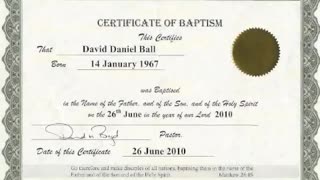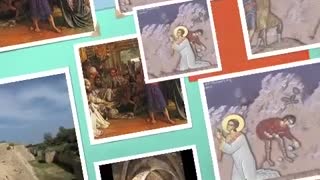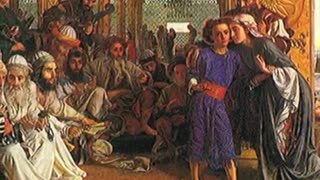Premium Only Content

Morning and Evening January 2nd Isaiah 41:1 Colossians 4:2
Morning
"Continue in prayer."
Colossians 4:2
It is interesting to remark how large a portion of Sacred Writ is occupied with the subject of prayer, either in furnishing examples, enforcing precepts, or pronouncing promises. We scarcely open the Bible before we read, "Then began men to call upon the name of the Lord;" and just as we are about to close the volume, the "Amen" of an earnest supplication meets our ear. Instances are plentiful. Here we find a wrestling Jacob--there a Daniel who prayed three times a day--and a David who with all his heart called upon his God. On the mountain we see Elias; in the dungeon Paul and Silas. We have multitudes of commands, and myriads of promises. What does this teach us, but the sacred importance and necessity of prayer? We may be certain that whatever God has made prominent in his Word, he intended to be conspicuous in our lives. If he has said much about prayer, it is because he knows we have much need of it. So deep are our necessities, that until we are in heaven we must not cease to pray. Dost thou want nothing? Then, I fear thou dost not know thy poverty. Hast thou no mercy to ask of God? Then, may the Lord's mercy show thee thy misery! A prayerless soul is a Christless soul. Prayer is the lisping of the believing infant, the shout of the fighting believer, the requiem of the dying saint falling asleep in Jesus. It is the breath, the watchword, the comfort, the strength, the honour of a Christian. If thou be a child of God, thou wilt seek thy Father's face, and live in thy Father's love. Pray that this year thou mayst be holy, humble, zealous, and patient; have closer communion with Christ, and enter oftener into the banqueting-house of his love. Pray that thou mayst be an example and a blessing unto others, and that thou mayst live more to the glory of thy Master. The motto for this year must be, "Continue in prayer."
Evening
"Let the people renew their strength."
Isaiah 41:1
All things on earth need to be renewed. No created thing continueth by itself. "Thou renewest the face of the year," was the Psalmist's utterance. Even the trees, which wear not themselves with care, nor shorten their lives with labour, must drink of the rain of heaven and suck from the hidden treasures of the soil. The cedars of Lebanon, which God has planted, only live because day by day they are full of sap fresh drawn from the earth. Neither can man's life be sustained without renewal from God. As it is necessary to repair the waste of the body by the frequent meal, so we must repair the waste of the soul by feeding upon the Book of God, or by listening to the preached Word, or by the soul-fattening table of the ordinances. How depressed are our graces when means are neglected! What poor starvelings some saints are who live without the diligent use of the Word of God and secret prayer! If our piety can live without God it is not of divine creating; it is but a dream; for if God had begotten it, it would wait upon him as the flowers wait upon the dew. Without constant restoration we are not ready for the perpetual assaults of hell, or the stern afflictions of heaven, or even for the strifes within. When the whirlwind shall be loosed, woe to the tree that hath not sucked up fresh sap, and grasped the rock with many intertwisted roots. When tempests arise, woe to the mariners that have not strengthened their mast, nor cast their anchor, nor sought the haven. If we suffer the good to grow weaker, the evil will surely gather strength and struggle desperately for the mastery over us; and so, perhaps, a painful desolation, and a lamentable disgrace may follow. Let us draw near to the footstool of divine mercy in humble entreaty, and we shall realize the fulfilment of the promise, "They that wait on the Lord shall renew their strength."
===
Charles Haddon (C.H.) Spurgeon (19 June 1834 -- 31 January 1892) was a British Particular Baptist preacher who remains highly influential among Christians of different denominations, among whom he is still known as the "Prince of Preachers". He was a strong figure in the Reformed Baptist tradition, defending the Church in agreement with the 1689 London Baptist Confession of Faith understanding, and opposing the liberal and pragmatic theological tendencies in the Church of his day.
Spurgeon was a prolific author of many types of works including sermons, an autobiography, commentaries, books on prayer, devotionals, magazines, poetry, hymns and more.Many sermons were transcribed as he spoke and were translated into many languages during his lifetime. Spurgeon produced powerful sermons of penetrating thought and precise exposition. His oratory skills held throngs of listeners spellbound in the Metropolitan Tabernacle and many Christians have discovered Spurgeon's messages to be among the best in Christian literature.
http://conservativeweasel.blogspot.com/2011/01/daily-devotional-sunday-2nd-january.html
-
 3:57
3:57
Morning and Evening from Spurgeon
3 years agoMorning and Evening December 24th Isaiah 40:5 2 Corinthians 8:9
211 -
 4:29
4:29
Morning and Evening from Spurgeon
4 years agoMorning and Evening January 11th
106 -
 4:25
4:25
Morning and Evening from Spurgeon
4 years agoMorning and Evening January 10th
53 -
 4:32
4:32
Morning and Evening from Spurgeon
4 years agoMorning and Evening January 9th
21 -
 4:32
4:32
Morning and Evening from Spurgeon
4 years agoMorning and Evening January 8th
47 -
 4:29
4:29
Morning and Evening from Spurgeon
4 years agoMorning and Evening January 6th Ezekiel 33:22 1 Peter 5:7
347 -
 4:25
4:25
Morning and Evening from Spurgeon
4 years agoMorning and Evening January 5th Genesis 1:4 Genesis 1:4
41 -
 4:50
4:50
Morning and Evening from Spurgeon
4 years agoMorning and Evening January 4th Genesis 42:8 2 Peter 3:18
120 -
 4:47
4:47
Morning and Evening from Spurgeon
4 years agoMorning and Evening January 3rd Luke 3:4 Isaiah 49:8
73 -
 4:34
4:34
Morning and Evening from Spurgeon
4 years agoMorning and Evening January 1st Song of Solomon 1:4 Joshua 5:12
388